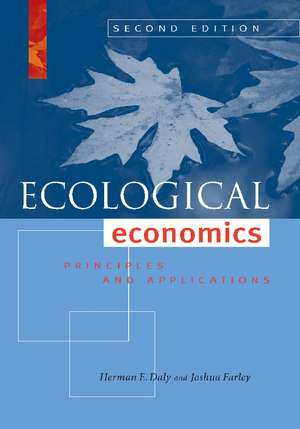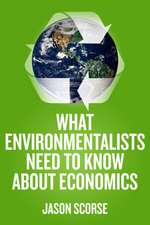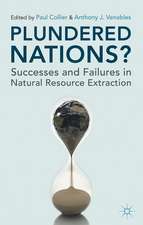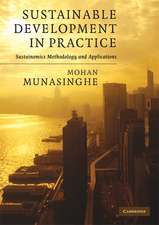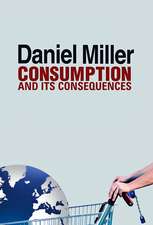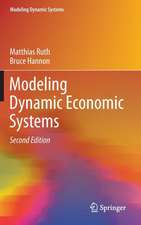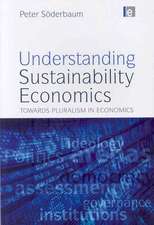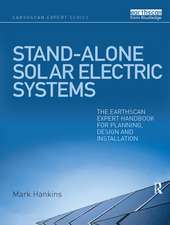Ecological Economics, Second Edition: Principles and Applications
Autor Herman E. Daly, Joshua Farleyen Limba Engleză Hardback – 17 oct 2010
In its first edition, this book helped to define the emerging field of ecological economics. This new edition surveys the field today. It incorporates all of the latest research findings and grounds economic inquiry in a more robust understanding of human needs and behavior. Humans and ecological systems, it argues, are inextricably bound together in complex and long-misunderstood ways.
According to ecological economists, conventional economics does not reflect adequately the value of essential factors like clean air and water, species diversity, and social and generational equity. By excluding biophysical and social systems from their analyses, many conventional economists have overlooked problems of the increasing scale of human impacts and the inequitable distribution of resources.
This introductory-level textbook is designed specifically to address this significant flaw in economic thought. The book describes a relatively new “transdiscipline” that incorporates insights from the biological, physical, and social sciences. It provides students with a foundation in traditional neoclassical economic thought, but places that foundation within an interdisciplinary framework that embraces the linkages among economic growth, environmental degradation, and social inequity. In doing so, it presents a revolutionary way of viewing the world.
The second edition of Ecological Economics provides a clear, readable, and easy-to-understand overview of a field of study that continues to grow in importance. It remains the only stand-alone textbook that offers a complete explanation of theory and practice in the discipline.
Preț: 475.91 lei
Preț vechi: 573.38 lei
-17% Nou
Puncte Express: 714
Preț estimativ în valută:
91.07€ • 95.76$ • 75.25£
91.07€ • 95.76$ • 75.25£
Carte disponibilă
Livrare economică 26 martie-09 aprilie
Livrare express 12-18 martie pentru 56.55 lei
Preluare comenzi: 021 569.72.76
Specificații
ISBN-13: 9781597266819
ISBN-10: 1597266817
Pagini: 544
Ilustrații: 56 photos and illustrations
Dimensiuni: 178 x 229 x 38 mm
Greutate: 1.16 kg
Ediția:Second Edition, Second Edition, Second Edition
Editura: Island Press
Colecția Island Press
ISBN-10: 1597266817
Pagini: 544
Ilustrații: 56 photos and illustrations
Dimensiuni: 178 x 229 x 38 mm
Greutate: 1.16 kg
Ediția:Second Edition, Second Edition, Second Edition
Editura: Island Press
Colecția Island Press
Notă biografică
Herman E. Daly is professor at the University of Maryland, School of Public Affairs. He is a cofounder of Ecological Economics, the leading journal in the discipline, and recipient of the Right Livelihood Award, also known as the “alternative Nobel Prize.”
Joshua Farley is a professor of community development and applied economics and assistant research professor at the Gund Institute for Ecological Economics at the University of Vermont.
Cuprins
Acknowledgments
A Note to Instructors
Introduction
PART I. An Introduction to Ecological Economics
Chapter 1. Why Study Economics?
Chapter 2. The Fundamental Vision
Chapter 3. Ends, Means,and Policy
PART II. The Containing and Sustaining Ecosystem: The Whole
Chapter 4. The Nature of Resources and the Resources of Nature
Chapter 5. Abiotic Resources
Chapter 6. Biotic Resources
Chapter 7. From Empty World to Full World
PART III. Microeconomics
Chapter 8. The Basic Market Equation
Chapter 9. Supply and Demand
Chapter 10. Market Failures
Chapter 11. Market Failures and Abiotic Resources
Chapter 12. Market Failures and Biotic Resources
Chapter 13. Microeconomic Concepts: GNP and Welfare
PART IV. Macroeconomics
Chapter 14. Macroeconomic Concepts:GNP and Welfare
Chapter 15. Money
Chapter 16. Distribution
Chapter 17. The IS-LM Model
PART V. Internatinal Trade
Chapter 18. International Trade
Chapter 19. Globalization
Chapter 20. Financial Globalization
PART VI. Policy
Chapter 21. General Policy Design Principles
Chapter 22. Sustainable Scale
Chapter 23. Just Distribution
Chapter 24. Efficient Allocation
-Looking Ahead
Glossary
Suggested Readings
About the Authors
Index
A Note to Instructors
Introduction
PART I. An Introduction to Ecological Economics
Chapter 1. Why Study Economics?
Chapter 2. The Fundamental Vision
Chapter 3. Ends, Means,and Policy
PART II. The Containing and Sustaining Ecosystem: The Whole
Chapter 4. The Nature of Resources and the Resources of Nature
Chapter 5. Abiotic Resources
Chapter 6. Biotic Resources
Chapter 7. From Empty World to Full World
PART III. Microeconomics
Chapter 8. The Basic Market Equation
Chapter 9. Supply and Demand
Chapter 10. Market Failures
Chapter 11. Market Failures and Abiotic Resources
Chapter 12. Market Failures and Biotic Resources
Chapter 13. Microeconomic Concepts: GNP and Welfare
PART IV. Macroeconomics
Chapter 14. Macroeconomic Concepts:GNP and Welfare
Chapter 15. Money
Chapter 16. Distribution
Chapter 17. The IS-LM Model
PART V. Internatinal Trade
Chapter 18. International Trade
Chapter 19. Globalization
Chapter 20. Financial Globalization
PART VI. Policy
Chapter 21. General Policy Design Principles
Chapter 22. Sustainable Scale
Chapter 23. Just Distribution
Chapter 24. Efficient Allocation
-Looking Ahead
Glossary
Suggested Readings
About the Authors
Index
Recenzii
"As ecological economics builds upon neoclassical economics, however, this single volume treatment of the relatively new field by Daley (emeritus, U. of Maryland) and Farley (U. of Vermont) goes beyond merely critiquing neoclassical models and instead incorporates them into the main body of the text, thus providing an introduction to many of the main concepts and issues found in standard texts on macroeconomics and microeconomics while also addressing the disciplinary and policy implications of the natural limits to growth."
Descriere
Ecological Economics is an introductory-level textbook for an emerging paradigm that addresses this flaw in much economic thought
